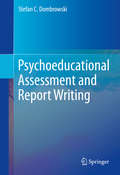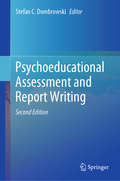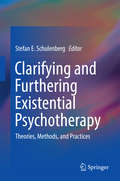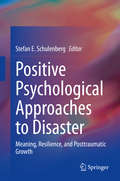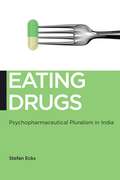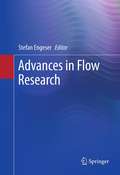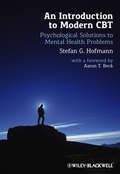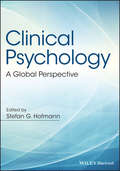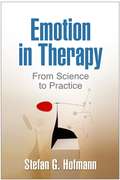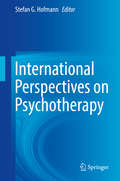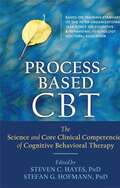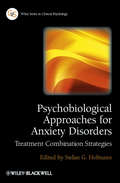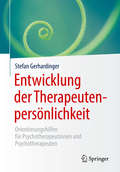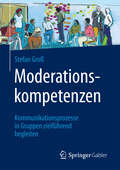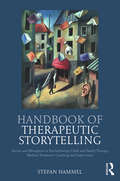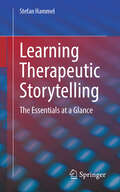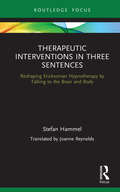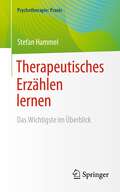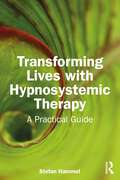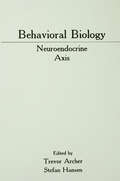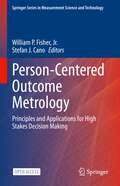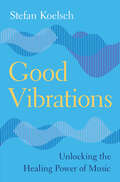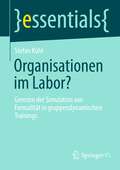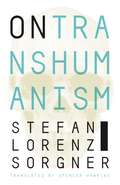- Table View
- List View
Psychoeducational Assessment and Report Writing
by Stefan C. DombrowskiThis textbook provides in-depth instruction for conducting psychoeducational assessments of children in grades K-12 and conveying results through detailed, well-written reports. It takes readers step by step through the assessment process - collecting data, writing reports, and communicating conclusions - for students with conditions spanning the range of IDEA classifications such as autism, learning disabilities, emotional disturbances, and conditions covered by Section 504. The book offers not only a broad understanding of assessment and communication skills, but also of the ethical, legal, cultural, and professional considerations that come with psychoeducational evaluation. And its sample reports model clear, well-organized results accessible to parents and caregivers as well as teachers and colleagues. Key areas of coverage include: * Assessment basics: the testing environment and protocols, interviewing, and observation. * Report writing section by section, from reason for referral to summary and recommendations. * Guidelines for oral reporting, with case examples. * Special issues in psychoeducational assessment and report writing. * Sample psychoeducational reports using this framework. Psychoeducational Assessment and Report Writing is an essential text for graduate students, researchers, professors, and professionals in child and school psychology; assessment, testing, and evaluation; social work; and psychological methods/evaluation.
Psychoeducational Assessment and Report Writing
by Stefan C. DombrowskiThe second edition of this textbook provides expanded and updated guidance on the process of psychoeducational assessment and report writing for children in grades K-12. It casts the entire process within a newly proposed evidence-based psychoeducational assessment and report writing framework, and explains how to convey results through detailed, well-written reports. The new edition guides readers, step by step, through the assessment process – collecting data, writing reports, and communicating conclusions – for students with conditions spanning the range of IDEA classifications. Chapters offer a broad understanding of assessment and communication skills as well as the ethical, legal, cultural, and professional considerations that come with psychoeducational evaluation. In addition, chapters significantly expand on the coverage of learning disabilities, autism spectrum, intellectual disabilities, gifted, and other health-impaired and emotional disturbance assessment. The text updates sample reports from the previous edition, offering annotated commentary in the report explaining salient points and major decisions, and incorporates additional report samples to demonstrate fully the assessment and report writing process. Key topics addressed in the revised and expanded edition include: Psychoeducational assessment and report writing in school and clinic settings. Interview formats from various perspectives, including caregivers/parents, teachers, and students. Assessment of culturally and linguistically diverse youth. Assessment of social, emotional, behavioral and mental health difficulties that may affect students’ educational functioning. Common academic difficulties, including reading, writing and mathematics. Common recommendations and accommodations for behavioral, social, emotional, and learning needs. Incorporation of response-to-intervention/curriculum based assessment data into the psychoeducational report. Psychoeducational Assessment and Report Writing, 2nd Edition, is an essential textbook for graduate students as well as researchers, professors, and professionals in child and school psychology, educational assessment, testing, and evaluation, social work, and related disciplines.
Clarifying and Furthering Existential Psychotherapy: Theories, Methods, and Practices (SpringerBriefs in Psychology)
by Stefan E. SchulenbergThis exciting volume brings together leading figures across existential psychology in a clear-sighted guide to its current practice and therapeutic possibilities. Its accessible yet scholarly presentation dispels common myths about existential psychotherapy while demonstrating core methods and innovative techniques as compatible with the range of clinicians' theoretical orientations and practical approaches. Chapters review the evidence for its therapeutic value, and provide updates on education, training, and research efforts in the field, both in the US and abroad. Throughout, existential psychotherapy emerges as a vital, flexible, and empirically sound modality in keeping with the current--and future--promotion of psychological well-being. Highlights of the coverage include: Emotion, relationship, and meaning as core existential practice: evidence-based foundations. · Meaning-centered psychotherapy: a Socratic clinical practice. Experience processing as an aspect of existential psychotherapy: life enhancement methodology. Structural Existential Analysis (SEA): a phenomenological method for therapeutic work. Experiencing change: an existential perspective. Creating the World Congress for existential therapy. Clarifying and Furthering Existential Psychotherapy will spark discussion and debate among students, therapists, researchers, and practitioners in existential psychology, existential psychotherapy, and allied fields as well as the interested public. It makes a suitable text for graduate courses in existential therapy, psychological theories, and related subjects.
Positive Psychological Approaches to Disaster: Meaning, Resilience, and Posttraumatic Growth
by Stefan E. SchulenbergWritten by prominent proponents of disaster mental health and/or positive psychology, this comprehensive book examines disaster mental health and positive psychology in the context of natural and technological disasters. Chapters in the first section focus on applications of meaning and resilience in the area of disaster mental health, both serving as primary examples of applications of positive psychology and related frameworks. Later chapters focus more specifically on key aspects of disaster mental health, including the importance of preparedness, training, and special populations. Contributors consistently align their insights with positive psychological approaches, either by explicitly referencing their relevance or alluding less directly to themes in positive psychology.Among the topics discussed:The role of religion and spirituality in finding meaning after disastersVeterans and disaster response workFirefighters: an occupational case study of resilienceStrategies for responding to adolescents following natural and technological disastersEffective crisis response for facilitating posttraumatic growthPositive Psychological Approaches to Disaster: Meaning, Resilience, and Posttraumatic Growth is a significant and timely collection of research, representing an effort of internationally respected scholars in positive psychology and disaster mental health.
Eating Drugs: Psychopharmaceutical Pluralism in India (Biopolitics #20)
by Stefan EcksA Hindu monk in Calcutta refuses to take his psychotropic medications. His psychiatrist explains that just as his body needs food, the drugs are nutrition for his starved mind. Does it matter how—or whether—patients understand their prescribed drugs? Millions of people in India are routinely prescribed mood medications. Pharmaceutical companies give doctors strong incentives to write as many prescriptions as possible, with as little awkward questioning from patients as possible. Without a sustained public debate on psychopharmaceuticals in India, patients remain puzzled by the notion that drugs can cure disturbances of the mind. While biomedical psychopharmaceuticals are perceived with great suspicion, many non-biomedical treatments are embraced. Stefan Ecks illuminates how biomedical, Ayurvedic, and homeopathic treatments are used in India, and argues that pharmaceutical pluralism changes popular ideas of what drugs do. Based on several years of research on pharmaceutical markets, Ecks shows how doctors employ a wide range of strategies to make patients take the remedies prescribed. Yet while metaphors such as "mind food" may succeed in getting patients to accept the prescriptions, they also obscure a critical awareness of drug effects.This rare ethnography of pharmaceuticals will be of key interest to those in the anthropology and sociology of medicine, pharmacology, mental health, bioethics, global health, and South Asian studies.
Advances in Flow Research
by Stefan EngeserThe concept of Flow was first explained by Csikszentmihalyi (1975), described as an "optimal experience," he noted that artists were entirely caught up in their projects, working feverishly to finish them and then lose all interest in their work after completion. The incentive lies in the act of creativity itself. The person feels optimally challenged while totally immersed in the activity. At the heart of flow research is the motivational aspect of this experience. Flow motivates people to carry out certain activities repeatedly, seeking a challenge in the act and looking to improve their skills and abilities. In this book, this motivational aspect will be imbedded in and related to other theories of (intrinsic) motivation and empirical work on flow and performance. The book provides a review of the current flow research, with a focus on rigorous analysis on methodology. The author takes the time to present methodological aspects in flow research to qualify empirical work. In addition, this volume presents neuropsychological considerations and empirical correlates of flow experiences. The work also describes various theoretical integrations of the different paths being taken within the field of flow research. It presents what has been learned since the beginning of flow research, what is still open, and how the mission to understand and foster flow experience research should continue.
An Introduction to Modern CBT
by Stefan G. HofmannAn Introduction to Modern CBT provides an easily accessible introduction to modern theoretical cognitive behavioral therapy models. The text outlines the different techniques, their success in improving specific psychiatric disorders, and important new developments in the field.* Provides an easy-to-read introduction into modern Cognitive Behavioral Therapy approaches with specific case examples and hands-on treatment techniques* Discusses the theoretical models of CBT, outlines the different techniques that have been shown to be successful in improving specific psychiatric disorders, and describes important new developments in the field* Offers useful guidance for therapists in training and is an invaluable reference tool for experienced clinicians
Clinical Psychology: A Global Perspective
by Stefan G. HofmannThis three-volume guide to CBT is a major new reference work that provides an authoritative and fully up-to-date survey of the various clinical approaches to cognitive behavior therapy. Contributed by leading academics and professionals, the entries are presented in a rational and accessible format. Offers unrivalled coverage of CBT approaches to a full spectrum of mental disorders Contributors include many of the field's leading experts Covers the full range of CBT strategies, including new developments in the field, such as attention retaining strategies, acceptance techniques, mindfulness meditation, and disorder-specific emotion regulation skills Provides practical guidance backed by a wealth of case studies Includes the latest techniques and empirical data 3 Volumes www. cbthandbook. com
Emotion in Therapy
by Steven C. Hayes Stefan G. HofmannGrounded in cutting-edge scientific research, this book presents innovative ways to explore and work with emotions in psychotherapy. Preeminent clinician-researcher Stefan G. Hofmann accessibly explains how emotions operate, what influences them, and how they can cause distress. He presents strategies that can significantly improve existing evidence-based treatments and promote positive affect and happiness. Clinicians are guided to help clients with any diagnosis gain emotional awareness and use emotion regulation techniques, mindfulness-based practices, and other effective strategies. "In Practice" features highlight specific clinical issues and offer illustrative case vignettes.
International Perspectives on Psychotherapy
by Stefan G. HofmannThis clear-sighted resource critically examines the status of clinical psychology practice across the diverse regions of the world. Dispatches from North and Latin America, Eastern and Central Europe, China, South Korea, Australia, Africa, the Middle East, and elsewhere illustrate in depth the universality of mental distress and disorders, and the intersection of local knowledge and established standards in providing effective care. Pathology and its treatment are viewed in light of cultural values, belief systems, ethics, and norms, reflecting the evolution of clinical practice toward personalized care and culturally sensitive intervention. This important information serves a number of immediate and long-term goals, including developing culture-specific diagnoses and treatments, improving professional competencies, and the ongoing exchange of ideas within a global field to benefit all patients worldwide. Coverage compares key areas such as: #65533; Concepts of mental pathology and health. #65533; The sociopolitical aspects of psychology, rooted in the history of the country/region. #65533; Popularly used approaches to intervention. #65533; Types of services and providers. #65533; The state of training and credentialing. #65533; Relationships between clinical psychology and indigenous healing traditions. The audience for Clinical Psychology across the World includes advanced undergraduate and graduate students and trainees/interns in clinical psychology, as well as developers of training programs. It can also serve as a valuable supplementary text for seminars or lectures on clinical psychology.
Process-Based CBT: The Science And Core Clinical Competencies Of Cognitive Behavioral Therapy
by Steven C. Hayes Stefan G. HofmannEdited by Steven C. Hayes and Stefan G. Hofmann, and based on the new training standards developed by the Inter-Organizational Task Force on Cognitive and Behavioral Psychology Doctoral Education, this groundbreaking textbook presents the core competencies of cognitive behavioral therapy (CBT) in an innovative, practically applicable way, with contributions from some of the luminaries in the field of behavioral science. CBT is one of the most proven-effective and widely used forms of psychotherapy today. But while there are plenty of books that provide an overview of CBT, this is the first to present the newest recommendations set forth by a special task force of the Association for Behavioral and Cognitive Therapies—and that focuses on the application of these interventions based on a variety of approaches for doctoral-level education and training. Starting with an exploration of the science and theoretical foundations of CBT, then moving into a thorough presentation of the clinical processes, this book constitutes an accessible, comprehensive guide to grasping and using even the most difficult competencies. Each chapter of Process-Based CBT is written by a leading authority in that field, and their combined expertise presents the best of behavior therapy and analysis, cognitive therapy, and the acceptance and mindfulness therapies. Most importantly, in addition to gaining an up-to-date understanding of the core processes, with this premiere text you’ll learn exactly how to put them into practice for maximum efficacy. For practitioners, researchers, students, instructors, and other professionals working with CBT, this breakthrough textbook—poised to set the standard in coursework and training—provides the guidance you need to fully comprehend and utilize the core competencies of CBT in a way that honors the behavioral, cognitive, and acceptance and mindfulness wings of the tradition.
Psychobiological Approaches for Anxiety Disorders
by Stefan G. HofmannPsychobiological Approaches for Anxiety Disorders presents a comprehensive overview of the latest empirical evidence and research results on combining pharmacological agents and CBT techniques for the treatment of anxiety disorders.The first book to focus on the issue of enhancing CBT with pharmacological agents Features chapters from leading authors in the fields of psychiatry, pharmacology, clinical psychology, neuroscience, and emotion researchContributes significantly to the field by summarizing the contemporary research in combination treatments in anxiety disordersA valuable resource for clinicians in training, as well as experienced clinicians seeking to help patients with anxiety disorders
Entwicklung der Therapeutenpersönlichkeit: Orientierungshilfen für Psychotherapeutinnen und Psychotherapeuten
by Stefan GerhardingerDie Entwicklung der Therapeutenpersönlichkeit ist kein Vorgang, der mit einer klassischen Berufsausbildung, einer Qualifizierungsmaßnahme, Weiter- oder Fortbildung im herkömmlichen Sinne verglichen werden kann. Insbesondere diejenigen, die in ihrem Werdegang an der Überlegensschwelle stehen, in den Psychotherapieberuf zu gehen, ganz besonders aber die in der Ausbildung befindlichen Psychotherapeut*innen und zeitlich folgend die frisch praktizierenden Psychotherapeut*innen benötigen Orientierung, was der Therapieberuf ihnen neben aller Technik abverlangt, aber auch geben kann.Dieses erzählerische Lehrbuch ist ein immer wieder hilfreicher Leitfaden, um eine Passung zwischen therapeutischer Tätigkeit und privat-persönlichem Rollenverständnis zu begünstigen. Die Entwicklung der Therapeutenpersönlichkeit kann keinesfalls in einer stringenten Kaskade von abzuarbeitenden Schritten beschrieben werden, vielmehr verstehen sich die einzelnen Kapitel dieses Buches als Inspiration, Nudges, Guidelines, Einladungen zur Selbstreflexion und Selbsterfahrung. Selbstredend werden allgemeingültige Standards beschrieben, darüber hinaus aber wird eine anregende Vielfalt aufgespannt, die im Rahmen unabdingbar maßgeblicher technisch-struktureller Aspekte eine persönliche Zielfindung und bewusste Entwicklung zu einem guten Therapeuten bzw. einer guten Therapeutin begünstigt. Die Entwicklung der Therapeutenpersönlichkeit wird immer ein überaus individueller Ablauf bleiben, zu dem dieses Buch Struktur und Inspiration gibt.
Moderationskompetenzen
by Stefan GroßDieses Buch vermittelt kompakt und fundiert Moderationskompetenz für alle, die Besprechungen, Meetings, Workshops oder Projektrunden erfolgreich leiten wollen. Wo dies gelingt, werden Kommunikationsprozesse in Gruppen zu zielorientierten, effektiven und effizienten Ergebnissen führen. Der Autor zeigt systematisch auf, wie der Informationsaustausch in solchen Gesprächsrunden klug vorgedacht, dynamisch begleitet und wirkungsvoll gesteuert werden kann. Die Basis dafür ist ein geklärtes Rollen-, Aufgaben- und Kompetenzverständnis. Mit zielführenden Fragen, methodischen Impulsen und unterschiedlichen Formaten der Beteiligung gelingt es, gemeinsam in der Gruppe Probleme zu lösen, Konflikte zu klären, nachhaltige Ideen zu entwickeln und gute Entscheidungen zu treffen. Am Ende solcher Veranstaltungen steht ein Mehrwert für alle: zufriedene Teilnehmer, tragfähige Resultate und eine kooperative Besprechungskultur, die die Grundlage für einen dauerhaften Unternehmenserfolg bilden.
Handbook of Therapeutic Storytelling: Stories and Metaphors in Psychotherapy, Child and Family Therapy, Medical Treatment, Coaching and Supervision
by Stefan HammelThe Handbook of Therapeutic Storytelling enables people in the healing professions to utilise storytelling, pictures and metaphors as interventions to help their patients. Communicating in parallel worlds and using simple images and solutions can help to generate positive attitudes, which can then be nurtured and enhanced to great effect. Following an "Introduction" to the therapeutic use of stories, which closes with helpful "Instructions for use", the book is divided into two parts, both of which contain a series of easily accessible chapters. Part One includes stories with specific therapeutic applications linked to symptoms and situations. Part Two explains and investigates methods and offers a wide range of tools; these include trance inductions, adaptation hints, reframing, the use of metaphor and intervention techniques, how stories can be structured, and how to invent your own. The book also contains a detailed reference section with cross-referenced key words to help you find the story or tool that you need. With clear guidance on how stories can be applied to encourage positive change in people, groups and organisations, the Handbook of Therapeutic Storytelling is an essential resource for psychotherapists and other professions of health and social care in a range of different settings, as well as coaches, supervisors and management professionals.
Learning Therapeutic Storytelling: The Essentials at a Glance
by Stefan HammelThe book provides a hypnosystemically grounded introduction to therapeutic storytelling in medicine, child therapy, adult psychotherapy, couples therapy, family therapy, social work, pastoral care, education, coaching, supervision, and related professional fields.Contents include:The relevance of storytelling to therapy.Why, when, and how stories have therapeutic effects.Where I can use therapeutic stories.How to find the right story for the right moment.Structuring a therapeutic story.How to start and continue.Enhancing narrative skills.About the Author:Stefan Hammel works as a systemic therapist, hypnotherapist, and author. He is also an protestant hospital and psychiatric chaplain, as well as the director of the Institute for Hypnosystemic Counseling in Kaiserslautern. Additionally, he serves as a lecturer for systemic and hypnotherapeutic training institutes in Germany, Austria, and Switzerland. He conducts seminars on Ericksonian hypnotherapy, therapeutic storytelling, systemic and hypnosystemic counseling. His main areas of focus include couple and family therapy, therapy for children and adolescents, depression, anxiety, trauma, end-of-life and grief counseling, as well as supporting somatic healing processes.
Therapeutic Interventions in Three Sentences: Reshaping Ericksonian Hypnotherapy by Talking to the Brain and Body
by Stefan HammelFollowing tenets set out by Milton Erickson, Therapeutic Interventions in Three Sentences: Reshaping Ericksonian Hypnotherapy by Talking to the Brain and Body presents an array of short, effective commands which have been developed for use in connection with a wide range of mental and psychosomatic disorders. Examining in detail the basic building blocks which must be in place in order for someone to send an effective command to his or her sub-conscious mind, the book presents an elegant way of using informal variations of Ericksonian hypnotherapy in awake states and transferring these principles to a variety of therapeutic settings. The methods described follow specific rules derived from hypnotherapy but can be integrated into any other form of counselling or therapy and can be used in short sessions, in telephone consultations and with patients in critical states, as well as conversations of a therapeutic nature by non-therapeutic professionals. The book explains why and how these interventions work, their general structure, and how they can be used to tackle specific needs such as trauma, depression, and anxiety disorders. The book will be of great interest to counsellors, doctors and therapists of different orientations who are looking for therapeutic methods that can be used in short sessions or with patients in critical states, as well as non-therapeutic professionals who engage in conversations of a therapeutic nature, such as social workers, pastors, nurses, carers and teachers (including SEN teachers).
Therapeutisches Erzählen lernen: Das Wichtigste im Überblick (Psychotherapie: Praxis)
by Stefan HammelDas Buch gibt eine hypnosystemisch fundierte Einführung in das therapeutische Erzählen in Medizin, Kindertherapie und Erwachsenenpsychotherapie, Paartherapie, Familientherapie, Sozialarbeit, Seelsorge, Pädagogik, Coaching, Supervision und verwandten Berufsfeldern. Aus dem Inhalt: Was Geschichtenerzählen mit Therapie zu tun hat. Warum, wann und wie Geschichten therapeutisch wirken. Wo ich therapeutische Geschichten einsetzen kann. Wie ich die rechte Geschichte zur rechten Zeit finde. Wie ich eine therapeutische Geschichte strukturiere. Wie ich anfange und wie ich weitermache. Wie ich meine erzählerischen Fähigkeiten erweitere. Über den Autor: Stefan Hammel arbeitet als systemischer Therapeut, Hypnotherapeut und Autor, als evangelischer Klinik- und Psychiatrieseelsorger sowie als Leiter des Instituts für Hypnosystemische Beratung in Kaiserslautern und als Referent systemischer und hypnotherapeutischer Ausbildungsinstitute in Deutschland, Österreich und in der Schweiz. Er hält Seminare zu Erickson'scher Hypnotherapie, therapeutischem Erzählen, systemischer und hypnosystemischer Beratung. Arbeitsschwerpunkte liegen in den Bereichen Paar- und Familientherapie, Kinder- und Jugendlichentherapie, Depression, Angst, Trauma, Sterbe- und Trauerbegleitung sowie der Unterstützung somatischer Heilung.
Transforming Lives with Hypnosystemic Therapy: A Practical Guide
by Stefan HammelThis book provides a practise-based introductory guide for practitioners wishing to integrate hypnosystemic therapy into their services, examining its roots, principles, and methods.Hypnosystemic therapy combines aspects of Ericksonian hypnosis, Systemic Therapy, and parts/constellation therapy into a creative awake hypnotherapy approach. This is then further consolidated in therapy or counselling. It is applied for overcoming psychological, medical, and social problems by use of conversational hypnosis mostly without trance induction. This text discusses how the intervention can be used in a variety of group and individual settings, in the treatment of diagnoses such as ADD/ADHD, allergies, hypertension, anxiety, phobias, sleeping disorders, addiction and eating disorders, and autism spectrum disorders. Chapters provide therapeutic tools in a straightforward, practical manner with examples.Presenting therapeutic interventions in such a clear way that they can be integrated instantly into the therapeutic work of any school, this book is of particular interest to systemic therapists, behavioral therapists, and others who wish to integrate hypnotherapy knowledge into their work, but remains relevant to any mental health or allied professional.
Behavioral Biology: Neuroendocrine Axis
by Trevor Archer Stefan HansenThis book is the result of an international symposium in biological psychology, held in honor of Knut Larsson. This renowned researcher -- in his search for the true meaning of "mind vs. matter" -- became involved in many divergent areas of the field, such as the neurobiology of sexual behavior and sexual differentiation, aspects of functional neuroanatomy, behavioral endocrinology, and psychopharmacology. Through experimentation and much consultation with other area specialists, Larsson observed such phenomena as the adaptation of behavior-determining neuroendocrine events to the physical environment and the hormonal regulation of sexual behavior and differentiation. This tribute to his research presents important features of necessary paradigms for the analysis and study of experimental psychology within the biological perspective.
Person-Centered Outcome Metrology: Principles and Applications for High Stakes Decision Making (Springer Series in Measurement Science and Technology)
by William P. Fisher Jr. Stefan J. CanoThis unique collection of chapters from world experts on person-centered outcome (PCO) measures addresses the following critical questions: Can individual experiences be represented in measurements that do not reduce unique differences to meaningless uniformity? How person-centric are PCO measures? Are PCO measurements capable of delivering the kind of quality assured quantification required for high-stakes decision making? Are PCO measures likely to support improved health care delivery? Have pivotal clinical studies failed to deliver treatments for diseases because of shortcomings in the PCO measures used? Are these shortcomings primarily matters of precision and meaningfulness? Or is the lack of common languages for communicating outcomes also debilitating to quality improvement, research, and the health care economy? Three key issues form an urgent basis for further investigation. First, the numbers generated by PCO measures are increasingly used as the central dependent variables upon which high stakes decisions are made. The rising profile of PCO measures places new demands for higher quality information from scale and test construction, evaluation, selection, and interpretation. Second, PCO measurement science has well-established lessons to be learned from those who have built and established the science over many decades. Finally, the goal in making a PCO measurement is to inform outcome management. As such, it is vitally important that key stakeholders understand that, over the last half century, developments in psychometrics have refocused measurement on illuminating clinically important individual differences in the context of widely reproduced patterns of variation in health and functioning, comparable scale values for quality improvement, and practical explanatory models.This book’s audience includes anyone interested in person-centered care, including healthcare researchers and practitioners, policy makers, pharmaceutical industry representatives, clinicians, patient advocates, and metrologists.This is an open access book.
Good Vibrations: Unlocking the Healing Power of Music
by Stefan KoelschThough used as a healing practice for centuries, only recently have we begun to unravel the science behind music's profound impact on the mind and body. In this book, neuroscientist Stefan Koelsch explores the groundbreaking research behind music's influence on human wellbeing: emotional, physical, and psychological. Beginning with an account of the human brain's innate capacity for music, Koelsch explains music's potential to evoke emotions and change our moods, soothe anxiety and alleviate pain. Featuring case studies, he documents the potential of music therapy for a wide range of conditions like depression, stroke recovery, and Alzheimer's. Filled with fascinating science and concrete tips and strategies, this book encourages anyone to harness the power of music for personal growth, healing, and joy.
Organisationen im Labor?: Grenzen der Simulation von Formalität in gruppendynamischen Trainings (essentials)
by Stefan KühlIn gruppendynamischen Trainings wird viel über das Leben in Freundeskreisen, Liebesbeziehungen, Jugendcliquen, Wohngemeinschaften, Straßengangs, Terrorgruppierungen oder Kleinfamilien, aber kaum etwas über die Dynamik in Unternehmen, Verwaltungen, Ministerien, Armeen, Polizeien, Krankenhäusern, Universitäten oder Schulen abgebildet. In diesem Buch wird gezeigt, wie gruppendynamische Trainings den Übergang von einer Gruppe zu einer Organisation unterbinden – durch den Druck zur personenbezogenen Kommunikation, durch ihre Entmutigung der Ausdifferenzierung von Rollen, durch die Verhinderung von Hierarchien und durch eine Tendenz zur Diffusität der Themen.
On Transhumanism
by Stefan Lorenz SorgnerTranshumanism is widely misunderstood, in part because the media have exaggerated current technologies and branded the movement as dangerous, leading many to believe that hybrid humans may soon walk among us and that immortality, achieved by means of mind-uploading, is imminent. In this essential and clarifying volume, Stefan Lorenz Sorgner debunks widespread myths about transhumanism and tackles the most pressing ethical issues in the debate over technologically assisted human enhancement.On Transhumanism is a vital primer on the subject, written by a world-renowned expert. In this book, Sorgner presents an overview of the movement’s history, capably summarizing the twelve pillars of transhumanist discourse and explaining the great diversity of transhumanist responses to each individual topic. He highlights the urgent ethical challenges related to the latest technological developments, inventions, and innovations and compares the unique cultural standing of transhumanism to other cultural movements, placing it within the broader context of the Enlightenment, modernity, postmodernity, and the philosophical writings of Nietzsche. Engagingly written and translated and featuring an introduction for North American readers, this comprehensive overview of the cultural and philosophical movement of transhumanism will be required reading for students of posthumanist philosophy and for general audiences interested in learning about the transhumanist movement.
On Transhumanism
by Stefan Lorenz SorgnerTranshumanism is widely misunderstood, in part because the media have exaggerated current technologies and branded the movement as dangerous, leading many to believe that hybrid humans may soon walk among us and that immortality, achieved by means of mind-uploading, is imminent. In this essential and clarifying volume, Stefan Lorenz Sorgner debunks widespread myths about transhumanism and tackles the most pressing ethical issues in the debate over technologically assisted human enhancement.On Transhumanism is a vital primer on the subject, written by a world-renowned expert. In this book, Sorgner presents an overview of the movement’s history, capably summarizing the twelve pillars of transhumanist discourse and explaining the great diversity of transhumanist responses to each individual topic. He highlights the urgent ethical challenges related to the latest technological developments, inventions, and innovations and compares the unique cultural standing of transhumanism to other cultural movements, placing it within the broader context of the Enlightenment, modernity, postmodernity, and the philosophical writings of Nietzsche. Engagingly written and translated and featuring an introduction for North American readers, this comprehensive overview of the cultural and philosophical movement of transhumanism will be required reading for students of posthumanist philosophy and for general audiences interested in learning about the transhumanist movement.
